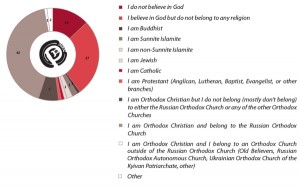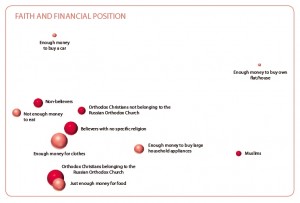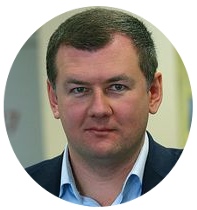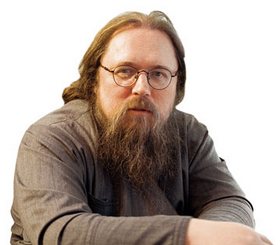The beliefs of Russians
05/04/2011“I believe faith to be man’s mental capacity,
which most distinguished him from the beast”.
Nikolai Pirogov,
scientist, doctor, teacher. (1810 — 1881).
The results of the All-Russian representative survey conducted by the service SREDA (field work: Public Opinion Foundation “PENTA”, sample 1500 people)
When asked about their religion, 82% of respondents (1,232 out of the 1,500 people surveyed) chose the response options representing a belief in God. 5% of respondents were undecided or chose “other”; and only 13% said that they “do not believe in God”.
As the poll shows, among Atheists there are twice as many men (68%) as women (32%). The majority of people defining themselves as non-religious were among the labourers and the poorest respondents (“not enough money even for food”).
Relatively more atheists live in the Far East than in other federal districts.
27% consider themselves as believers, but do not identify themselves with any religion. These were the respondents who chose the answer “I believe in God but do not belong to any religion”. Among the youth, aged 18 to 24, more than a third of respondents selected this
answer (34%). Among students and pupils, 38% chose this answer. Also, relatively more respondents chose this answer among the inhabitants of the Urals Federal District.
There were very few Buddhist, Jewish, Catholic or Protestant respondents: this number is within the sampling error.
4% called themselves Muslims. Half of these respondents were the followers of Sunni, the other 2% related to other areas of Islam.
Most Muslims live in Volga, South and North Caucasus districts. More often than the other respondents, Muslims live in villages. Relatively more often than on average, Muslim respondents had three or more children.
50% of Russians consider themselves to be Orthodox Christians; the vast majority of them belong to the Russian Orthodox Church. Among the Orthodox there are significantly more women than men (62% women, 38% men). Orthodox Christian families more often
have 2 children and less often have no children. Orthodox respondents live in urban areas more often than other respondents: 40% are residents of cities with populations over 250
thousand people.
The Central Federal District, compared with other federal districts, has the largest amount of Orthodox Christians.
Half of the non-working pensioners said that they belonged to the Russian Orthodox Church. In this regard, it is not surprising that among the Russian Orthodox Church followers there is the largest proportion of people who do not have enough money for clothes or
shoes.
Considerably less than average is the number of Orthodox Christians among students and pupils (38%).
Unemployed Russians in search of work more often than other respondents called themselves Orthodox who do not belong to the Russian Orthodox Church or other Orthodox churches.
The North-West Federal District leads in terms of the number of citizens who define themselves as “Orthodox, not belonging to the Russian Orthodox Church”.
In Russia, the proportion of religious citizens (82%) is significantly larger than in many European countries. For example, as reported by Interfax, according to a survey conducted by the international research company “Ipsos” – Sweden has 37% non-believers, Belgium
– 36%, UK – 34%, Germany – 31%. In total, Interfax reports, only half of the world’s population believes in God.





